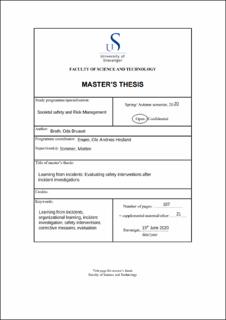| dc.description.abstract | This master's thesis is about learning from incidents and following up on safety interventions implemented after incident investigations in oil and gas companies involved in the Norwegian petroleum industry. The starting point was previous research which has observed that several organizations often fail to exploit the learning potential that comes with undesirable incidents, because, among other things, they rarely evaluate the safety interventions they have implemented after investigations. The purpose of this thesis has been to test whether these findings also apply to organizations within the petroleum industry. It was therefore questioned whether the oil and gas companies could learn more from incidents by establishing better practices for evaluating safety interventions implemented after investigations.
To answer this, it has been an objective to generate empiricism that can say something about what is the current practice for evaluating safety interventions. Second, it has been an aim to explain why organizations in this industry may not evaluate. Third, it was natural to consider what kind of learning the oil and gas companies theoretically achieve by current practice for evaluation.
An intensive and exploratory research design underlies this study, where an abductive research strategy was followed. This combines both self-collected empiricism and pre-existing theories to answer the problem and research questions. Data were obtained by combining qualitative methods such as various forms of interviews and content analysis. In general, however, most of the data is based on expert opinions from individuals with good insight into how most oil and gas companies typically follow up on the safety interventions they implement, as well as possible explanations for current practice.
After the data collection was completed and the empirical findings were discussed in light of theoretical perspectives on organizational learning and evaluation, as well as compared with findings from previous research, it became clear that previous observations that organizations do not learn as much as they can from incidents because they do not evaluate implemented interventions, also apply to the oil and gas companies that participated in this study. The companies rarely evaluate the safety interventions they have implemented following investigations. The reason for this has been found to be multifaceted, where, based on the statements of the participants in this study, it appears that it is the combination of several factors that results in interventions rarely being evaluated. Mainly, however, it seemed that the most salient explanatory explanations were that evaluation is not prioritized despite being considered as important, that evaluation is perceived as challenging to perform in practice due to particularly lack of information about the objective(s) with, target group for and the background of a safety intervention, and that the Synergy information system is not optimal for the purpose of evaluating implemented interventions. The reason why evaluation is not prioritized is, based on the empirical results, a negative safety culture in which company employees think of evaluation as something that you do not have to prioritize if you do not want to, and that they are more concerned about "closing deviations" than checking whether implemented safety interventions actually have a positive impact on the safety level of the companies. At the same time, the reader should note that this is only one possible explanation for the problem, because an abductive logic was used to answer the research questions.
Furthermore, it was discussed that the companies by current, almost non-existent evaluation practices result in a low level of organizational learning. The oil and gas companies are not learning as much as they could have done through better evaluation practices. To achieve higher order organizational learning, evaluation can be a very effective tool. An evaluation of both the effect of safety interventions and how the implementation process itself took place, could serve as an essential input to the companies' safety management.
Further, important findings from this master's thesis are also that it has been argued that failure to evaluate is a repeating pattern across most organizations within the industry in question. In addition, it was said that most companies generally rarely evaluate safety interventions, including those implemented outside of incident investigations. Therefore, the lack of evaluation of implemented interventions is a pervasive problem.
Finally, in order to stimulate to more evaluation of implemented safety interventions, some practical implications were proposed, i.e. some concrete suggestions for how the oil and gas companies can improve. Further, aspects that should be addressed in further research were also mentioned. | en_US |
